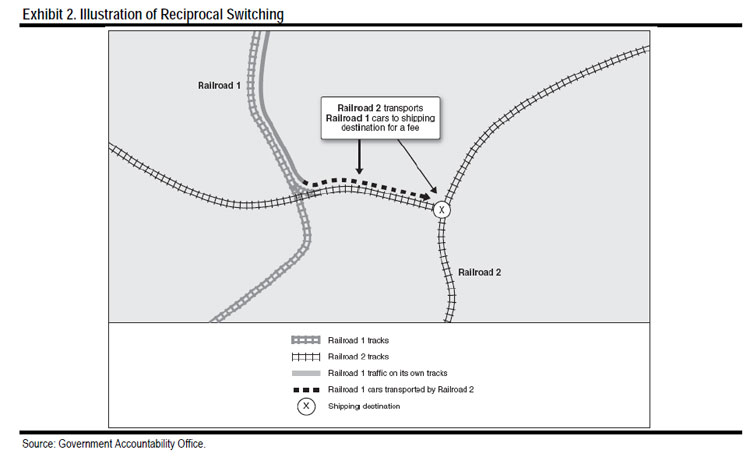From SCDigest's On-Target E-Magazine
July 12, 2011
Logistics News: Shipper Group Proposes New Rules to STB to Regulate Rail Carriage Through "Reciprocal Switching"
Detailed Proposal for New Rules Likely to Be Successful, Experts Say, Forcing STB's Hand; New BNSF Option for Houston Chemical Makers Captive to UP?
SCDigest Editorial Staff
Last week, the National Industrial Transportation League (NIT League) filed a petition with the Surface Transportation Board (STB), the agency in charge of railroad regulation, to mandate a practice called "reciprocal switching," a form a competitive access that requires railroads to move cars from other carriers for a predetermined fee. This would provide one answer to the "captive shipper" problem the STB has been looking at for years and increase overall rail competition.
SCDigest Says: |
 |
| That report from Christensen Associates noted that "reciprocal switching and terminal agreements were more likely to create favorable economic benefit/cost conditions than more sweeping access reforms." |
|
What Do You Say?
|
|
|
|
NIT League is a shipper-based organization formed more than 100 years ago. It says the petition is needed because current rules, written over 25 years ago, "require shippers to show that competitive abuse or serious inadequate service exists in order to obtain reciprocal switching. The end result is that the rules prescribed for reciprocal switching have set such high barriers that no shipper or receiver has been able to meet these standards."
Of late, US rail carriers are doing very well financially - perhaps too well, once again drawing the attention of regulators. Last month, the STB held public hearings, for example, on the state of rail competition, during which NIT League says "contrasting views were presented by shippers and Class I rail carriers on whether changes were necessary in the Board’s competitive access rules that today govern the freight rail industry."
Reciprocal switching (see graphic below, from the Government Accountability Office)) is a practice where one carrier moves another carrier's cars on its tracks for a fee. While many carriers have such agreements in place now, the practice is not mandatory, and the fees for the move are lightly regulated. Canada currently has an interswitching program in place similar to the NIT League proposal, in which a shipper can request service from a secondary carrier if the second rail is within approximately 18 miles.
Reciprocal switching is needed for "captive shippers" who have only one rail alternative. By in effect forcing one rail carrier to switch rail cars to another carrier's track at a reasonable fee, that shipper might then have another option that would bring more competition into the equation. Some studies have shown that captive shippers pay 20% more for equivalent rail transport than non-captive rail shippers.
NIT League gets Specific
The 70-page proposal sent by NIT League to the STB makes a strong case for why new regulations are needed and actually provides the language of the proposed changes the group would like to see added to current regulations. The document was prepared by lawyers representing NIT League from the Washington DC firm of Thompson Hine LLP, who worked with NIT League's rail committee. The full petition can be found here: NIT League Reciprocal Switching Petition to the STB.

The League’s petition requests that the STB eliminate the current criteria required for a Class I railroad to enter into a reciprocal switching agreement with another carrier in favor of new regulations that would require Class I rail carriers to enter into a competitive switching arrangement when several defined conditions are met by the shipper.
(Transportation Management Article Continued Below)
|